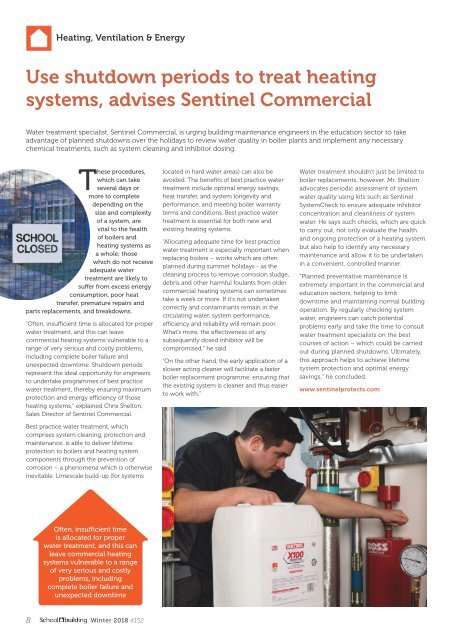You also want an ePaper? Increase the reach of your titles
YUMPU automatically turns print PDFs into web optimized ePapers that Google loves.
Heating, Ventilation & Energy<br />
Use shutdown periods to treat heating<br />
systems, advises Sentinel Commercial<br />
Water treatment specialist, Sentinel Commercial, is urging building maintenance engineers in the education sector to take<br />
advantage of planned shutdowns over the holidays to review water quality in boiler plants and implement any necessary<br />
chemical treatments, such as system cleaning and inhibitor dosing.<br />
These procedures,<br />
which can take<br />
several days or<br />
more to complete<br />
depending on the<br />
size and complexity<br />
of a system, are<br />
vital to the health<br />
of boilers and<br />
heating systems as<br />
a whole; those<br />
which do not receive<br />
adequate water<br />
treatment are likely to<br />
suffer from excess energy<br />
consumption, poor heat<br />
transfer, premature repairs and<br />
parts replacements, and breakdowns.<br />
“Often, insufficient time is allocated for proper<br />
water treatment, and this can leave<br />
commercial heating systems vulnerable to a<br />
range of very serious and costly problems,<br />
including complete boiler failure and<br />
unexpected downtime. Shutdown periods<br />
represent the ideal opportunity for engineers<br />
to undertake programmes of best practice<br />
water treatment, thereby ensuring maximum<br />
protection and energy efficiency of those<br />
heating systems,” explained Chris Shelton,<br />
Sales Director of Sentinel Commercial.<br />
Best practice water treatment, which<br />
comprises system cleaning, protection and<br />
maintenance, is able to deliver lifetime<br />
protection to boilers and heating system<br />
components through the prevention of<br />
corrosion – a phenomena which is otherwise<br />
inevitable. Limescale build-up (for systems<br />
located in hard water areas) can also be<br />
avoided. The benefits of best practice water<br />
treatment include optimal energy savings,<br />
heat transfer, and system longevity and<br />
performance, and meeting boiler warranty<br />
terms and conditions. Best practice water<br />
treatment is essential for both new and<br />
existing heating systems.<br />
“Allocating adequate time for best practice<br />
water treatment is especially important when<br />
replacing boilers – works which are often<br />
planned during summer holidays - as the<br />
cleaning process to remove corrosion sludge,<br />
debris and other harmful foulants from older<br />
commercial heating systems can sometimes<br />
take a week or more. If it’s not undertaken<br />
correctly and contaminants remain in the<br />
circulating water, system performance,<br />
efficiency and reliability will remain poor.<br />
What’s more, the effectiveness of any<br />
subsequently dosed inhibitor will be<br />
compromised,” he said.<br />
“On the other hand, the early application of a<br />
slower acting cleaner will facilitate a faster<br />
boiler replacement programme, ensuring that<br />
the existing system is cleaner and thus easier<br />
to work with.”<br />
Water treatment shouldn’t just be limited to<br />
boiler replacements, however. Mr. Shelton<br />
advocates periodic assessment of system<br />
water quality using kits such as Sentinel<br />
SystemCheck to ensure adequate inhibitor<br />
concentration and cleanliness of system<br />
water. He says such checks, which are quick<br />
to carry out, not only evaluate the health<br />
and ongoing protection of a heating system<br />
but also help to identify any necessary<br />
maintenance and allow it to be undertaken<br />
in a convenient, controlled manner.<br />
“Planned preventative maintenance is<br />
extremely important in the commercial and<br />
education sectors, helping to limit<br />
downtime and maintaining normal building<br />
operation. By regularly checking system<br />
water, engineers can catch potential<br />
problems early and take the time to consult<br />
water treatment specialists on the best<br />
courses of action – which could be carried<br />
out during planned shutdowns. Ultimately,<br />
this approach helps to achieve lifetime<br />
system protection and optimal energy<br />
savings,” he concluded.<br />
www.sentinelprotects.com<br />
Often, insufficient time<br />
is allocated for proper<br />
water treatment, and this can<br />
leave commercial heating<br />
systems vulnerable to a range<br />
of very serious and costly<br />
problems, including<br />
complete boiler failure and<br />
unexpected downtime<br />
8<br />
Winter 2018 <strong>4152</strong>
















